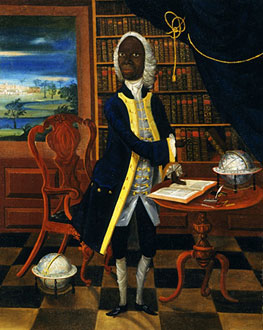Black History Month Read-along: Francis Williams

Welcome to a special read-along in celebration of Black History Month throughout October. Today we’re reading a poem by Francis Williams.
Born in Jamaica sometime around 1690, Williams’ enslaved parents were freed a few years into his life. Williams grew up in a wealthy family, where his father challenged laws and managed to extend the legal rights of white colonial slave-owners to himself and his family. Williams was educated in England as a lawyer and throughout his life showed an aptitude for learning, eventually returning to Jamaica to start the first free school for black children – before then free schools were exclusive to white children.
Williams education, and particularly his Latin poetry, proved immensely divisive because he was black. The slave trade was predicated on the notion that black people were inherently inferior to white people, and Williams challenged this in a very public way by not only being an educated black man but by displaying his brilliant intellect and remarkable sensitivity to the human condition in a way that could not be ignored by the white British community. There was great debate over whether Williams poetry was really any good, as those who wanted to continue enslaving others were greatly threatened by his talents. Today Williams is a complicated figure given his family’s ownership of slaves and his general support for the British colonial project, but there is no denying he was hugely influential.
We are reading the only surviving poem that was undeniably written by Williams, An Ode to George Haldane, which was preserved in Edward Long’s A History of Jamaica. Long included the poem in order to ridicule it; it shows how influential Williams was that even an account by a man such as Long (who was known to be racist) included a significant amount about Williams’ life and work. This is Long’s translation of the ode, written originally in Latin:
AT length revolving fates th’ expected year
Advance, and joy the live-long day shall cheer,
Beneath the fost’ring law’s auspicious dawn
New harvests rife to glad th’ enliven’d lawn.
With the bright prospect blest, the swains repair
In social bands, and give a loose to care.
Rash councils now, with each malignant plan,
Each faction, that in evil hour began,
At your approach are in confusion fled,
Nor, while you rule, shall rear their dastard head.
Alike the master and the slave shall fee
Their neck reliev’d, the yoke unbound by thee.
Ere now our guiltless isle, her wretched fate
Had wept, and groan’d beneath th’ oppressive weight
Of Cruel woes; save thy victorious hand,
Long fam’d in war, from Gallia’s hostile land;
And wreaths of fresh renown, with generous zeal,
Had freely turn’d, to prop our sinking weal.
Form’d as thou art, to serve Britannia’s crown,
While Scotia claims thee for her darling son;
Oh! best of heroes, ablest to sustain
A falling people, and relax their chain.
Long as this isle shall grace the Western deep,
From age to age, thy fame shall never sleep.
Thee, her dread victor Guadeloupe shall own,
Crusht by thy arm, her slaughter’d chiefs bemoan;
View their proud tents all level’d in the dust,
And, while she grieves, confess the cause was just.
The golden Iris the sad scene will share,
Will mourn her banners scatter’d in the air;
Lament her vanquisht troops with many a sigh,
Nor less to see her towns in ruin lie.
Fav’rite of Mars! believe, th’ attempt were vain,
It is not mine to try the arduous strain.
What! shall an Mthwy touch the martial string,
Of battles, leaders, great achievements sing?
Ah no! Minerva, with th’ indignant Nine,
Restrain him, and forbid the bold design.
To a Buchanan does the theme belong;
A theme, that well deserves Buchanan’s song,
‘Tis he, should swell the din of war’s alarms,
Record thee great in council, as in arms;
Recite each conquest by thy valour won,
And equal thee to great Peleides’ son.
That bard, his country’s ornament and pride,
Who e’en with Maro might the bays divide:
Far worthier he, thy glories to rehearse,
And paint thy deeds in his immortal verse.
We live, alas! where the bright god of day,
Full from the zenith whirls his torrid ray:
Beneath the rage of his consuming fires,
All fancy melts, all eloquence expires.
Yet may you deign accept this humble song,
Tho’ wrapt in gloom, and from a falt’ring tongue;
Tho’ dark the stream on which the tribute flows,
Not from the skin, but from the heart it rose.
To all of human kind, benignant heaven
(Since nought forbids) one common soul has given.
This rule was ‘stablish’d by th’ Eternal Mind;
Nor virtue’s self, nor prudence are confin’d
To colour; none imbues the honest heart;
To science none belongs, and none to art.
Oh! Muse, of blackest tint, why shrinks thy breast.
Why fears t’ approach the Coesar of the West!
Dispel thy doubts, with confidence ascend
The regal dome, and hail him for thy friend:
Nor blush, altho’ in garb funereal drest,
Thy body’s white, tho’ clad in sable vest.
Manners unsullied, and the radiant glow
Of genius, burning with desire to know;
And learned speech, with modest accent worn,
Shall best the sooty African adorn.
An heart with wisdom fraught, a patriot flame.
A love of virtue; these shall lift his name
Conspicuous, far beyond his kindred race,
Distinguish’d from them by the foremost place.
In this prolific isle I drew my birth,
And Britain nurs’d, illustrious through the earth;
This, my lov’d isle, which never more shall grieve,
Whilst you our common friend, our father live.
Then this my pray’r — “My earth and heaven survey
“A people ever blest, beneath your sway!”
This poem is taken from “From a Jamaica Portfolio,” available online through JSTOR’s Early Journal Content initiative. Richmond upon Thames Library members can read more about Francis Williams in the Oxford Dictionary of National Biography.

Leave a Reply